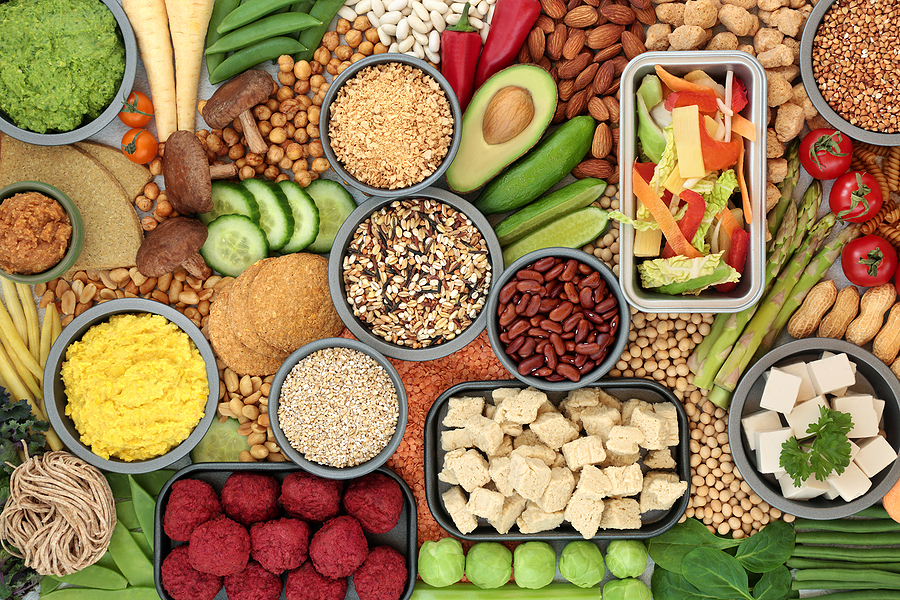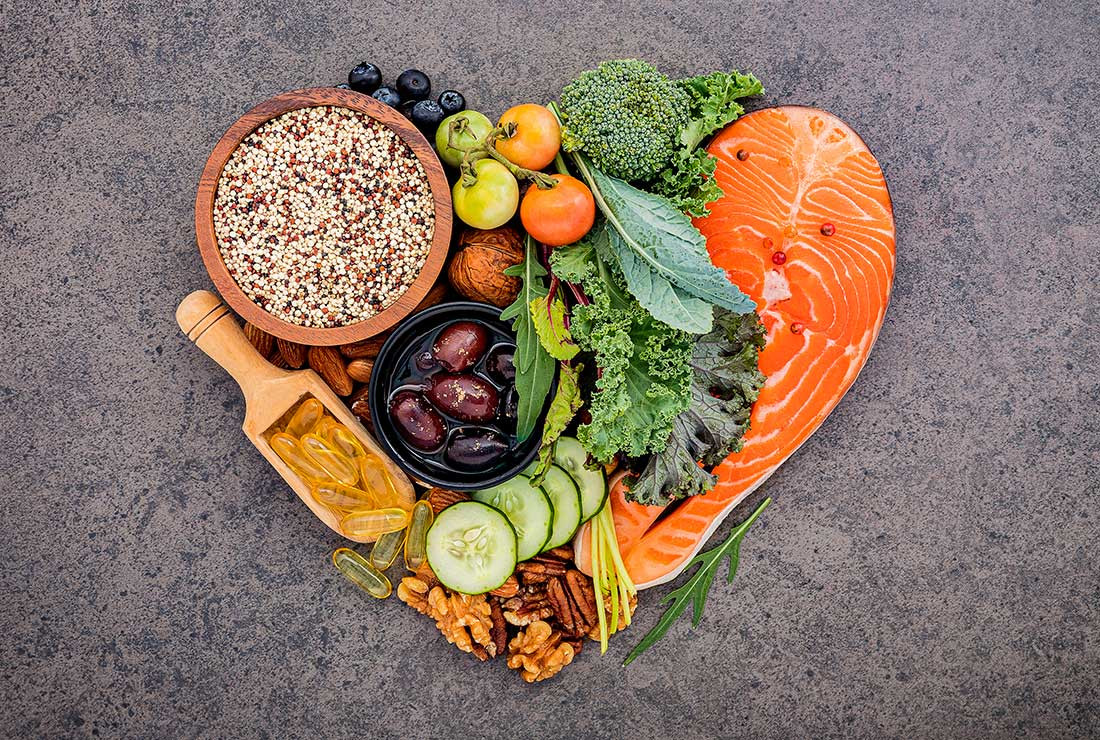The Best Sugar Free Sauces for Diabetics Living a Plant-Based Lifestyle
The Best Sugar Free Sauces for Diabetics Living a Plant-Based Lifestyle
Blog Article
All Regarding Healthy And Balanced Food: Advantages of Enjoying Plant Based Options
The conversation bordering plant-based diet plans has actually gotten substantial interest recently. Lots of people are discovering the possible health advantages, nutritional advantages, and environmental impacts connected with these dietary selections. As individuals come to be a lot more familiar with their food's influence on wellness and sustainability, inquiries develop concerning the functionalities of adopting such a way of life. What specific changes can one expect, and just how might these selections reshape not just personal health and wellness yet also the earth's future?
Comprehending Plant-Based Diet Plans
Although lots of people associate plant-based diet plans mostly with vegetarianism or veganism, these diet plans can encompass a variety of consuming patterns that focus on entire, minimally processed plant foods. Such diets frequently consist of fruits, vegetables, entire grains, seeds, vegetables, and nuts, while limiting or removing pet products. This adaptability allows people to tailor their dietary selections according to dietary demands and individual preferences. Some may embrace a mostly plant-based diet regimen while still periodically consuming meat or dairy products, commonly referred to as a flexitarian method. The focus remains on integrating more plant foods, which can cause a diverse array of tastes and meals. Understanding these various interpretations of plant-based consuming is essential for appreciating its ease of access and charm in modern food society.
Wellness Conveniences of Plant-Based Foods
The health and wellness benefits of plant-based foods are significant, using a nutrient density benefit that supports overall health. Research suggests that these foods can enhance heart health and play an essential function in effective weight management. By incorporating a lot more plant-based alternatives, individuals may improve their nutritional choices and promote long-term health and wellness.
Nutrient Thickness Advantage
Nutrient thickness plays an essential function in the health and wellness benefits of plant-based foods, making them a compelling choice for those seeking a well balanced diet regimen. Plant-based foods, such as fruits, vegetables, beans, nuts, and whole grains, are often abundant in vital vitamins, minerals, and anti-oxidants while being lower in calories. This high nutrient thickness permits people to take in less calories while still fulfilling their nutritional demands. In addition, these foods are loaded with dietary fiber, promoting digestive health and aiding in weight management. By integrating nutrient-dense plant-based choices, customers can boost their total health, sustain their immune systems, and reduce the danger of persistent illness. Ultimately, the nutrient thickness of plant-based foods emphasizes their importance in a health-conscious way of life.
Heart Health Improvement

Weight Monitoring Assistance
In addition to advertising heart health, a plant-based diet can significantly assist in weight monitoring. This nutritional approach highlights entire foods such as fruits, vegetables, vegetables, nuts, and entire grains, which are normally lower in calories and greater in fiber contrasted to animal-based products. The high fiber content aids increase satiation, minimizing general calorie consumption. Plant-based diet plans are commonly abundant in necessary nutrients while reduced in undesirable fats, making it simpler to keep a healthy weight. Research study suggests that people that adopt a plant-based lifestyle tend to have reduced body mass indexes (BMIs) and experience more effective weight loss compared to those that take in meat-heavy diets. Welcoming plant-based options is a calculated selection for efficient weight management.
Nutritional Value of Plant-Based Ingredients
Plant-based active ingredients are rich in vital nutrients, providing a diverse variety of vitamins, minerals, and antioxidants that add to total wellness. A contrast of protein resources exposes that while pet products are typically deemed exceptional, my link lots of plant-based choices supply ample healthy protein and various other helpful compounds. Recognizing the nutritional value of these active ingredients can assist people make informed nutritional options.
Crucial Nutrients in Plants
Nutrient-rich ingredients discovered in plants supply a varied variety of crucial minerals and vitamins that add significantly to general wellness. These components are abundant in vitamins A, C, and K, which support immune feature, vision, and blood clotting, respectively. In enhancement, plants provide essential minerals such as potassium, magnesium, and calcium, essential for heart health, muscular tissue function, and bone toughness. The visibility of fiber in plant-based foods help food digestion and promotes a healthy and balanced gut microbiome. Antioxidants, discovered perfectly in vegetables and fruits, aid combat oxidative anxiety and reduce inflammation. Lots of plant foods are reduced in calories yet high in nutrients, making them an outstanding choice for those seeking to keep a healthy weight while ensuring optimal nutrient consumption.

Comparing Healthy Protein Resources
Protein resources vary considerably in their dietary profiles, with plant-based components supplying distinct benefits. Unlike animal proteins, which typically have hydrogenated fats and cholesterol, plant healthy proteins tend to be lower in these harmful elements. Legumes, nuts, seeds, and entire grains are rich in vital amino acids, fiber, vitamins, and minerals. For example, lentils provide high healthy protein content alongside significant iron and folate, while quinoa is a complete protein, using all nine essential amino acids. In addition, plant-based proteins are often gone along with by antioxidants and phytochemicals that sustain general wellness. The shift to plant-based healthy protein sources not only boosts dietary consumption however also aligns with lasting nutritional methods, decreasing environmental influence and advertising long-term wellness advantages.
Environmental Impact of Plant-Based Consuming
As awareness of climate adjustment expands, numerous people are exploring lasting nutritional choices that can considerably decrease their ecological footprint. Plant-based consuming has actually become a substantial factor to lowering greenhouse gas exhausts, which are primarily related to animals production. The growing of fruits, beans, veggies, and grains usually calls for fewer sources, such as water and land, compared to animal farming. Additionally, plant-based diet plans can bring about decreased logging, as much less land is needed for grazing animals or growing pet feed. By changing towards plant-based alternatives, customers can support biodiversity and advertise healthier environments. Generally, accepting plant-based consuming not just advantages individual wellness yet additionally stands for a crucial step towards environmental sustainability and preservation efforts.
Overcoming Common Misconceptions
While numerous people acknowledge the advantages of a plant-based diet plan, several mistaken beliefs often prevent them from completely welcoming this way of life. An usual belief is that plant-based diet plans do not have adequate healthy protein; nevertheless, many plant sources, such as legumes, nuts, and tofu, give sufficient healthy protein. Additionally, some assume that this diet regimen is expensive, when as a matter of fact, staples like beans, rice, and seasonal vegetables can be rather economical. Another false impression is that plant-based consuming is overly limiting, whereas it really offers a diverse range of tastes and foods. Several stress that a plant-based diet regimen may lead to shortages, yet with correct planning, people can acquire all essential nutrients, consisting of vitamins and minerals, while taking pleasure in a large range of delicious dishes. Large Tips for Transitioning to a Plant-Based Way of living
Making the shift to a plant-based lifestyle can be an enriching experience, though it frequently calls for some support to navigate the initial changes. People are encouraged to begin gradually, incorporating more fruits, veggies, beans, and entire grains right into their dishes while minimizing meat and dairy products consumption. Dish planning is important; preparing an once a week food selection can assist ease the change and prevent final unhealthy selections. Discovering cooking approaches and brand-new dishes can additionally preserve and enhance the experience enjoyment regarding plant-based consuming. Additionally, joining support system or communities can offer inspiration and share beneficial pointers. Remaining informed about nutrition assurances balanced dishes, protecting against shortages while promoting a healthy and balanced, gratifying plant-based lifestyle.

Delicious Plant-Based Meal Ideas
Discovering tasty plant-based meal concepts can inspire individuals to embrace a more healthy diet regimen. One prominent alternative is a passionate quinoa salad, including cherry tomatoes, cucumber, and a spicy lemon-tahini clothing. An additional fave is a mouthwatering lentil stew, loaded with carrots, celery, and fragrant herbs, ideal for a comforting dinner. For breakfast, over night oats made with almond milk, chia seeds, and topped with fresh berries provide a nutritious beginning to the day. Furthermore, a vibrant vegetable stir-fry with tofu and a weblink range of vibrant veggies can be a fast yet satisfying meal. Velvety avocado toast on whole-grain bread, sprinkled with seeds and spices, uses a simple yet flavorful snack. These dishes display the selection and richness of plant-based eating.

Regularly Asked Questions
Can a Plant-Based Diet Regimen Offer Enough Healthy Protein?
The question of whether a plant-based diet plan can give sufficient protein prevails. Numerous resources, consisting of legumes, nuts, seeds, and whole grains, can fulfill protein needs efficiently, supporting a well balanced and nutritious diet regimen for people.
Are Plant-Based Diet Plans Suitable for Children?
The viability of plant-based diet plans for children relies on mindful preparation. Ample nutrients have to be ensured, consisting of minerals, proteins, and vitamins. With proper assistance, such diet plans can sustain healthy and balanced development and advancement in kids.
Exactly how Do I Eat in restaurants on a Plant-Based Diet regimen?
Dining out on a plant-based diet regimen involves looking for restaurants with varied food selections, asking for modifications, and exploring vegan-friendly choices. Planning in advance and connecting nutritional preferences can enhance the dining experience while keeping dietary options.
What Are Common Irritants in Plant-Based Foods?
Typical allergens in plant-based foods include soy, gluten, nuts, and seeds - BBQ Sauces. People following a plant-based diet regimen must know these allergens and review tags thoroughly to avoid unfavorable responses and ensure safe intake
Can Plant-Based Diets Aid With Weight Management?
Research study suggests that adopting a plant-based diet regimen may assist in fat burning as a result of its normally lower calorie thickness and higher fiber content. This combination can improve satiety, helping individuals manage their calorie consumption effectively. Numerous people click for source link plant-based diet regimens mainly with vegetarianism or veganism, these diet regimens can include a large range of consuming patterns that prioritize whole, minimally processed plant foods. Nutrient density plays a vital duty in the wellness advantages of plant-based foods, making them an engaging selection for those seeking a balanced diet regimen. Plant-based diets have been shown to significantly enhance heart health, as they often have components that sustain cardiovascular function. In addition to advertising heart wellness, a plant-based diet can considerably assist in weight monitoring. A common belief is that plant-based diet regimens lack sufficient healthy protein; nonetheless, various plant resources, such as beans, nuts, and tofu, provide adequate protein.
Report this page